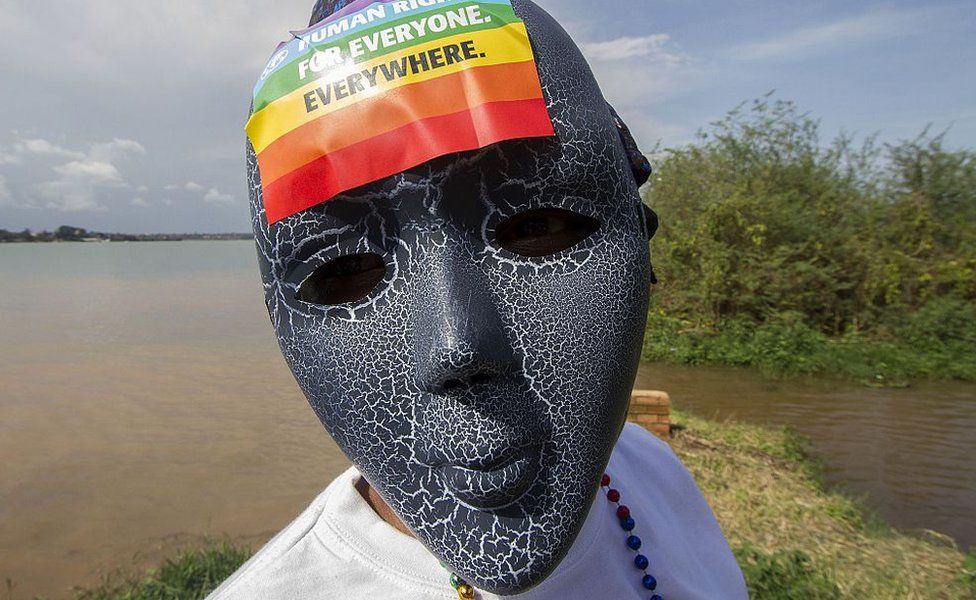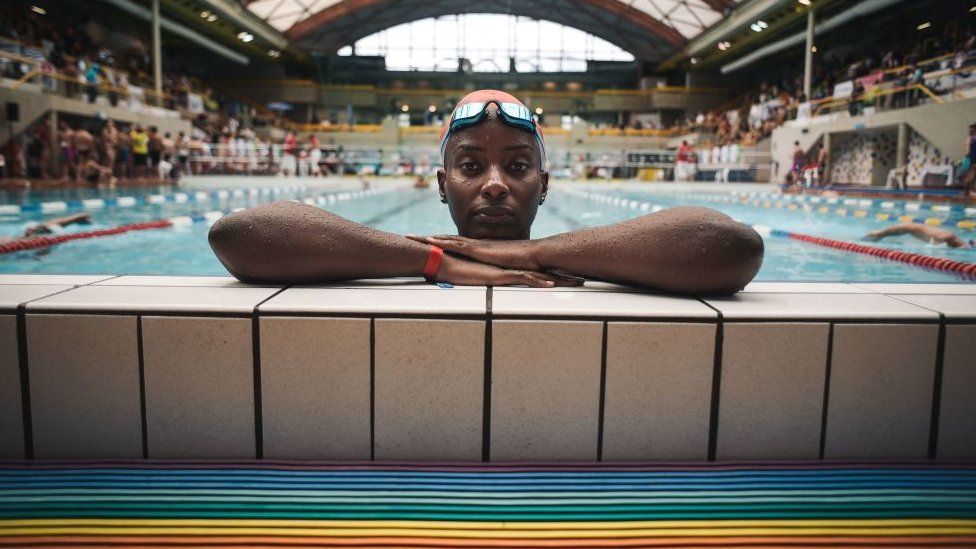A support group in Uganda is helping parents come to terms with their children’s sexuality.

image copyrightAFP
When Rita heard rumours that her son was gay she refused to believe it.
At the time, she thought that homosexuality was an abomination – a “problem” that happened elsewhere, not in Uganda.
When she finally realised the truth, she felt that something bad had invaded her own home.
“When I confirmed it, I wept. I wept because I could not believe it… I locked myself in and wept,” she told the BBC’s Comb podcast.
Uganda’s hostility towards homosexuality is well known.
Gay sex is punishable by life imprisonment, and LGBTI people often face discrimination, threats and harassment.
But the battle over gay rights is often thought of as a situation with two clear sides – LGBTI individuals on one hand, and homophobic communities on the other.
The reality is a lot more messy, with parents like Rita caught in the middle – between the strongly held beliefs they have grown up with and the plight of their loved ones.
A group in Uganda is trying to help parents like Rita understand and accept their children, and deal with the challenges and trauma of living with homophobia.
Rita found out about the rumours surrounding her son from a friend, who had heard people saying that he was homosexual.
She was in turmoil and started to think about whether there had been signs that she had missed.
Eventually, her son confirmed it was true that he was gay.
With friends and neighbours talking about the family, Rita locked herself in the house to escape the gossip andpublic shame, while her son’s father blamed her, saying she had failed as a mother.
Eventually, she says she “soothed herself”, realising that no-one else would look out for her son, and she tried to find a way to deal with the situation.
Rita found herself totally alone at a time when she needed advice and support. A huge turning-point for her came when her son heard about the new support group, and encouraged her to attend.
The group is called PFLAG Uganda, which stands for Parents and Families of Lesbians and Gays. Its aim is to create a safe space where parents can come together with others who are in the same situation, to ask the questions and have the conversations that they would never normally dare to.
The group’s founder is Clare Byarugaba, an openly lesbian LGBTI activist who was inspired by her own family’s experience.
Clare was outed by local tabloids before she had spoken to her family about her sexuality. She had no warning, and no way to prepare her parents for learning the truth and dealing with the shame that came with the revelations.

image copyrightAFP
For gay Ugandans, one of the most painful costs of their sexuality can be rejection from families.
Clare’s conviction is that for LGBTI people who are already so vulnerable in a country where homophobia is rampant, home should be the safest place, where they can always come back to and feel fully accepted.
But to achieve that, Clare realised that parents need support as well.
She felt compassion for what her parents were going through, essentially being outed as parents of an LGBTI child – considered one of the biggest sources of shame in Uganda.
She realised that the kind of support and solidarity she was able to draw on within the LGBTI community was not available for parents, whose experiences and perspectives were so different.
Clare looked to the PFLAG movement which started in the US, and adapted it to fit the local context.
The aim is to provide a safe space where parents can speak to a clinical psychologist and progressive religious leaders, as well as their fellow parents.
Meetings are conducted in the Luganda language and, as well as peer support, the group provides access to accurate information about homosexuality and practical advice on how to cope in a homophobic environment.
The group met for the first time at the end of 2019, with nine mothers and one father attending.
Each member talked about their story – how they had learned of their child’s sexual or gender identity, how they felt at the time and how they are doing now.

You may also be interested in:

Clare recalls her emotions seeing the parents who had entered the room so nervously. How they met each other for the first time, heard experiences that were so similar and realised that they were not alone.
She describes the feelings they shared in that session as being equivalent to grieving for their children.
Rita was one of the group’s inaugural members and attending the meetings changed her:
“I couldn’t believe that an organisation cared even for us parents.
“I was very happy to see other parents like me, sitting at one table. Everyone you looked at had given birth to a child like mine.”
Clare Byarugaba
At the beginning they were using derogatory terms to describe their children. Now their language has changed to: ‘Yes, that’s my child. That’s my child'”

The support of the other parents has helped her to stop listening to rumours, and to re-establish the mother-son relationship which she felt like she had lost.
She even started giving him relationship advice again, like she would with her other children.
Clare says that progress in the group has been visible in simple things like changes in the kind of language that the parents are using.
“At the beginning they were using derogatory terms to describe their children. Now their language has changed to: ‘Yes, that’s my child. That’s my child’,” she says.
For some members, like Rita, understanding their own children has also made parents think differently about the rest of Uganda’s LGBTI community.
Having originally thought that homosexuality was an abomination, now Rita feels protective towards all of Uganda’s LGBTI individuals.
The last year has seen homophobic discrimination intensify, with measures around the coronavirus pandemic allowing for an increase in raids and harassment carried out under the guise of public health measures.
George Wafula/BBC
Accept your child knowing that this is who they are and won’t change. If you don’t accept them, neither will the world”

With Uganda’s LGBTI community even more vulnerable than usual, Rita even welcomed some individuals into her home.
She also has the confidence now to speak to other parents, to help them to deal with the situation they find themselves in.
“I advise parents who have such children to accept them first.
“Accept your child knowing that this is who they are and won’t change… they are not any other person’s child. If you don’t accept them, neither will the world.
“It’s your strength and acceptance as a mother that gives your child strength.”
*Rita’s name has been changed to protect her identity